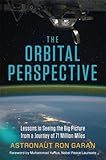The orbital perspective : lessons in seeing the big picture from a journey of seventy-one million miles / astronaut Ron Garan.
Material type: TextSeries: BK currents book: Publisher: Oakland, CA : Berrett-Koehler Publishers, Inc., [2015]Copyright date: ©2015Edition: First editionDescription: xiv, 185 pages, [16] pages of plates : illustrations (some color) ; 24 cmContent type: text Media type: unmediated Carrier type: volumeISBN: 9781626562462; 1626562466Subject(s): Garan, Ron, Jr. (Ronald J.), 1961- | International Space Station | Garan, Ron, Jr. (Ronald J.), 1961- | International Space Station | Astronauts -- United States -- Biography | Astronautics -- International cooperation | Peaceful change (International relations) | Astronautics -- International cooperation | Astronauts | Peaceful change (International relations) | United StatesGenre/Form: Autobiographies. | Biography. | Autobiographies.DDC classification: 629.450092 | B LOC classification: TL789.85.G37 | A3 2015TL789.85.G37 | G37 2015
TextSeries: BK currents book: Publisher: Oakland, CA : Berrett-Koehler Publishers, Inc., [2015]Copyright date: ©2015Edition: First editionDescription: xiv, 185 pages, [16] pages of plates : illustrations (some color) ; 24 cmContent type: text Media type: unmediated Carrier type: volumeISBN: 9781626562462; 1626562466Subject(s): Garan, Ron, Jr. (Ronald J.), 1961- | International Space Station | Garan, Ron, Jr. (Ronald J.), 1961- | International Space Station | Astronauts -- United States -- Biography | Astronautics -- International cooperation | Peaceful change (International relations) | Astronautics -- International cooperation | Astronauts | Peaceful change (International relations) | United StatesGenre/Form: Autobiographies. | Biography. | Autobiographies.DDC classification: 629.450092 | B LOC classification: TL789.85.G37 | A3 2015TL789.85.G37 | G37 2015| Item type | Current library | Call number | Copy number | Status | Notes | Date due | Barcode |
|---|---|---|---|---|---|---|---|
 Books
Books
|
Female Library | TL789.85.G37 .A3 2015 (Browse shelf (Opens below)) | 1 | Available | STACKS | 51952000334903 | |
 Books
Books
|
Main Library | TL789.85.G37 .A3 2015 (Browse shelf (Opens below)) | 1 | Available | STACKS | 51952000334910 |
Browsing Main Library shelves Close shelf browser

|
No cover image available |

|

|

|

|

|
||
| TL709 .M388 2006 Elements of propulsion : gas turbines and rockets / | TL709.5 .T87 T73 1996 Aircraft gas turbine engine technology / | TL781 .V358 2012 Rocketing into the future : the history and technology of rocket planes / | TL789.85.G37 .A3 2015 The orbital perspective : lessons in seeing the big picture from a journey of seventy-one million miles / | TL793 .I468 2015 Beyond : our future in space / | TL9 .H23 2003 Illustrated dictionary of automobile body styles / | TL153 .R46 2019 Automotive service management : principles into practice / |
Includes bibliographical references and index.
A shift in perspective -- Looking skyward. Humanity's home in the heavens ; Space, the shared frontier ; Lessons in collaboration from the ISS Program -- Looking earthward. One moment in space ; The orbital perspective ; The key is "we" -- Looking forward. Camp Hope ; Arrested development ; Mass collaboration -- A web of trust.
For astronaut Ron Garan, living on the International Space Station was a powerful, transformative experience--one that he believes holds the key to solving our problems here on Earth. On space walks and through windows, Garan was struck by the stunning beauty of the Earth from space but sobered by knowing how much needed to be done to help this troubled planet. And yet on the International Space Station, Garan, a former fighter pilot, was working work side by side with Russians, who only a few years before were "the enemy." If fifteen nationalities could collaborate on one of the most ambitious, technologically complicated undertakings in history, surely we can apply that kind of cooperation and innovation toward creating a better world. That spirit is what Garan calls the "orbital perspective." Garan vividly conveys what it was like learning to work with a diverse group of people in an environment only a handful of human beings have ever known. But more importantly, he describes how he and others are working to apply the orbital perspective here at home, embracing new partnerships and processes to promote peace and combat hunger, thirst, poverty, and environmental destruction. This book is a call to action for each of us to care for the most important space station of all: planet Earth.
1 2

There are no comments on this title.